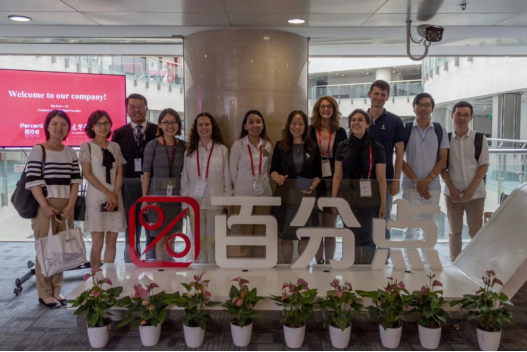BEIJING, July 9, 2018-- Peking University’sBeltand Road Institute welcomed five young Sinologists from Belarus, Germany, Italy, Kazakhstan, and Russia to the Guanghua School of Management through the P.R.C. Department of Culture’s “Visiting Program for Young Sinologists.” These scholars were nominated by their countries’ respective embassy or consulates to participate in a program including 7 days of academic activities at Guanghua. These activities aimed to help answer questions pertinent to their specific research areas as well as understand more about China’s development more generally.
Scholars’ research topics include Chinese FDI in countries around the globe, Chinese involvement in Africa as seen through port projects, the entrepreneurial endeavors of overseas returnees, Over the course of their time at Guanghua, each scholar was paired with a Chinese postgraduate business student who could provide practical assistance during their time on campus and also serve as a sounding board for research ideas. Scholars were also provided with access to other academic resources and had opportunities to meet individually with professor at Guanghua and other Peking University faculties to discuss questions surrounding their research areas.

To provide a foundation for dialogue, TANG Yao, LI Xing, and SHEN Ji conducted lectures entitled “China’s Economy: Opportunities and Challenges,” “Marketing & the Internet Economy,” and “Chinese Capital Markets.” During the first session, Professor TANG enumerated on the debt challenges the government is seeking to address, the implications of an aging population, the role SOEs play in the economy, and the establishment of the Xiong’an District. Professor LI later introduced his research on the ways in which pollution levels can impact consumer purchasing behavior. Finally, Professor SHEN provided an overview of China’s stock markets. Thus, in addition to their specific fields of expertise, visiting scholars had the opportunity to ask other questions about how China and its development, including: What measures have been taken to tackle China’s pollution challenges? How have consumption habits of young people changed from earlier generations? How do land purchase arrangements in China work? What will happen if there is a sudden, unexpected change in housing market prices?

Guanghua also tapped into its extensive alumni network to organize site visits to big data analysis firm Percent, smart parking solutions provider AIPark, and environmental conservation non-profit The Paradise International Foundation to help the visiting scholars gain better insight into ways in which China’s firms are applying cutting-edge technologies and ideas to business. Executives from each of these firms personally took time to discuss their company business models with the group and share ways in which their companies are innovating in their respective industries, as well as ways they aim to bring their expertise overseas.
In sharing reflections on their experience at Guanghua, scholars shared that they enjoyed the mix of lectures, independent research time, and company visits and appreciated the warm reception they were given. The participants from Kazakhstan and Belarus pointed out that their countries have only had direct contact with China for about 30 years, making exchange programs particularly crucial in building mutual understanding and cooperation between countries going forward. Several participants also indicated that, despite the short period of time that had passed since their last visits to China, there are already many aspects of the country they do not recognize because of the rapid change and development that’s occurred.

This program embodied what the Belt and Road Institute is all about—giving people from different countries the opportunity to interact with one another, learn about ways in which China has tackled its economic challenges and seized on its opportunities, and put these ideas in conversation with the way other countries have managed their own economic development. We are looking forward to more of these interactions to come through the Institute’s other programs.
 Programs
Programs